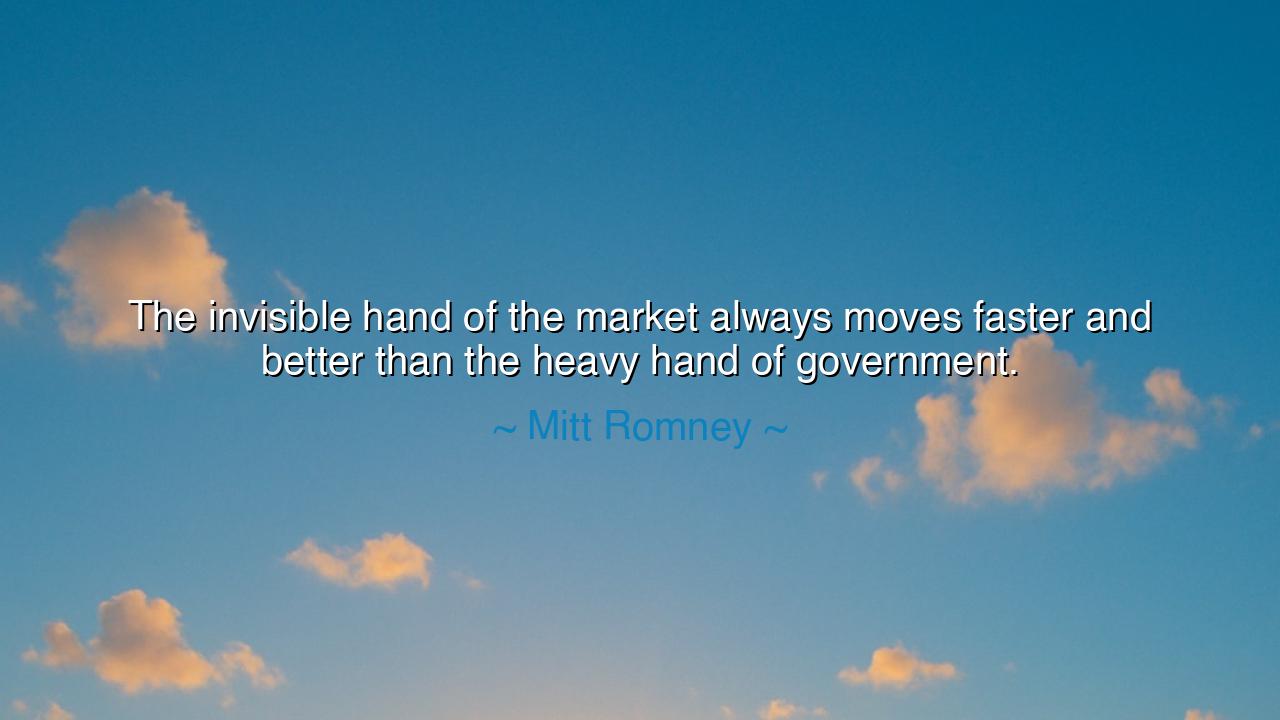
The invisible hand of the market always moves faster and better
The invisible hand of the market always moves faster and better than the heavy hand of government.






Host: The evening feels calm, the air in the room filled with thoughtfulness as Jack and Jeeny reflect on Mitt Romney’s quote. The idea of the "invisible hand" and the contrasting role of government in the market invites a deeper discussion about freedom, regulation, and the balance between the two. Jack takes a slow breath, considering the implications of the statement.
Jeeny: "Mitt Romney once said, 'The invisible hand of the market always moves faster and better than the heavy hand of government.' It’s a powerful statement, but also one that’s likely to stir up some debate, don’t you think? What do you make of the idea that the market can regulate itself better than the government can?"
Jack: He pauses, clearly reflecting on the words. "Romney’s quote taps into a classic economic theory: that the market, when left to its own devices, will naturally regulate itself, allocate resources, and respond to demand more efficiently than any government intervention. The ‘invisible hand’—as coined by Adam Smith—is the idea that individual actions motivated by self-interest will ultimately benefit society as a whole, creating balance without the need for central control." He looks at Jeeny thoughtfully. "It’s a belief that markets are self-correcting and efficient, that businesses will innovate, compete, and provide better services if left free of regulation."
Jeeny: "I see what he’s getting at—the market can be more nimble, right? It responds quickly to consumer needs, to new technologies, and to shifts in demand. When government steps in, it can be slow, bogged down by bureaucracy, and less adaptive. But there’s a catch, isn’t there? The market might move fast, but is it always moving in the right direction? Can we really trust it to do what’s best for everyone, especially when there’s no guarantee that those who benefit from it are doing so in a way that’s fair or ethical?" She looks at Jack, her tone shifting to a more reflective note. "Is there a balance between the two? Or do we risk leaving vulnerable groups behind when we only trust the market to drive progress?"
Jack: "That’s exactly the tension. The idea of the invisible hand suggests that by focusing on individual freedom and competition, the market will work itself out and lead to the best outcome. But in reality, the market doesn’t always account for externalities—things like inequality, environmental harm, or exploitation. Without regulation, these problems can become bigger than any company can solve on its own. There’s no automatic correction when it comes to fairness or social good." He pauses, his voice softening. "Government has a role in addressing those gaps—protecting consumers, ensuring that industries aren’t abusing power, and promoting social welfare. So, while the market can be fast and efficient, it doesn’t always provide for the public good in the same way that thoughtful, intentional government action can."
Jeeny: "Exactly. The idea of the market as this perfect system that will naturally take care of everything is tempting, but it doesn’t always work in practice. We need safeguards, rules, and oversight to ensure that the market isn’t just creating wealth—it’s creating wealth ethically and equitably. And there are things like public health, education, and infrastructure that won’t be provided by the market alone, because there’s no immediate profit to be made from them." She pauses, her expression more serious. "So, while the market can drive innovation and efficiency, it also needs the guiding hand of government to ensure that no one is left behind, and that the benefits are shared more widely."
Jack: "Right. It’s about finding the balance between the two. The market can fuel growth, but the government has to step in when that growth leaves some people behind or when it causes harm that isn't addressed. It’s not about stifling innovation, but about creating a framework that ensures businesses are held accountable and that the needs of the many are considered, not just the few." He leans forward, his voice more emphatic now. "Without regulation, we risk letting the most powerful players in the market set the rules, often at the expense of the environment, workers, or consumers."
Jeeny: "And that’s why regulation exists—to keep things from spiraling out of control. We can’t just let the market run wild. It’s not about limiting freedom, it’s about ensuring fairness and creating a system where everyone can benefit. The market and government aren’t mutually exclusive—they’re complementary." She smiles, the conversation sparking clarity for her. "The challenge is finding that sweet spot where both can work together to create a better society."
Host: The room seems to pause, the quiet understanding settling between them. The quote from Mitt Romney has opened a broader conversation about the role of government and the market, highlighting both the power of individual freedom and the need for collective responsibility. Jack and Jeeny sit with the realization that the question isn’t about choosing one over the other—but about finding a balance that allows both to work together for the common good.
As the evening continues, their conversation leaves them with a deeper understanding: that while the market may move fast and offer innovation, the government’s role in ensuring fairness, justice, and protection for all is just as crucial. Together, they can create a system where both freedom and responsibility coexist, shaping a better, more sustainable future.






AAdministratorAdministrator
Welcome, honored guests. Please leave a comment, we will respond soon